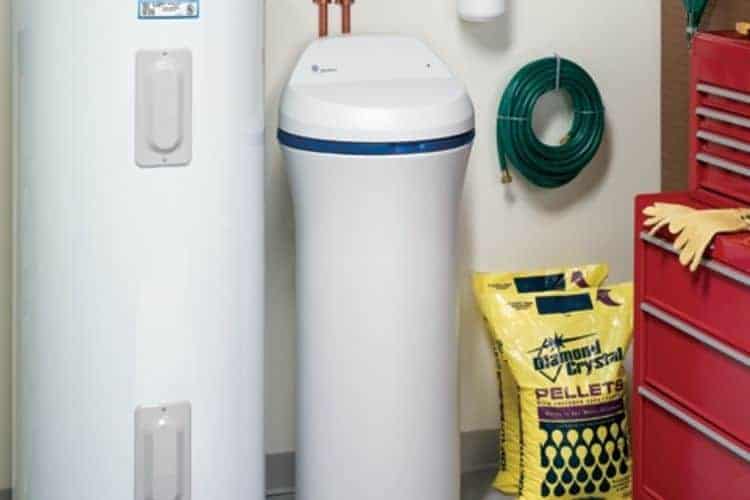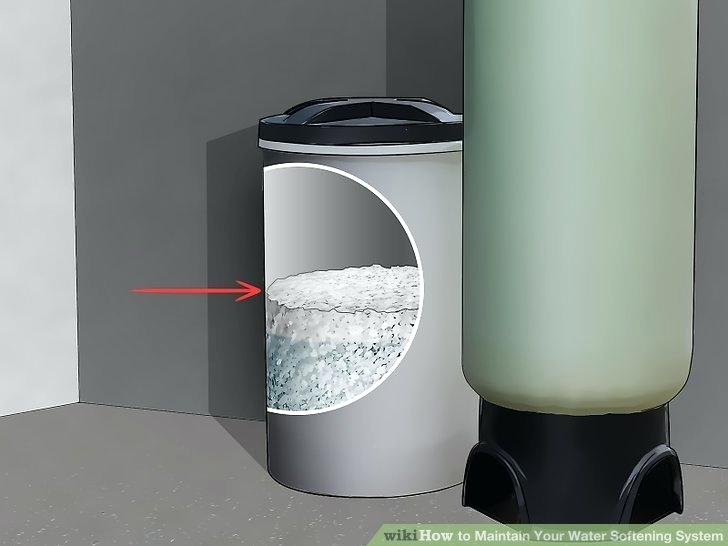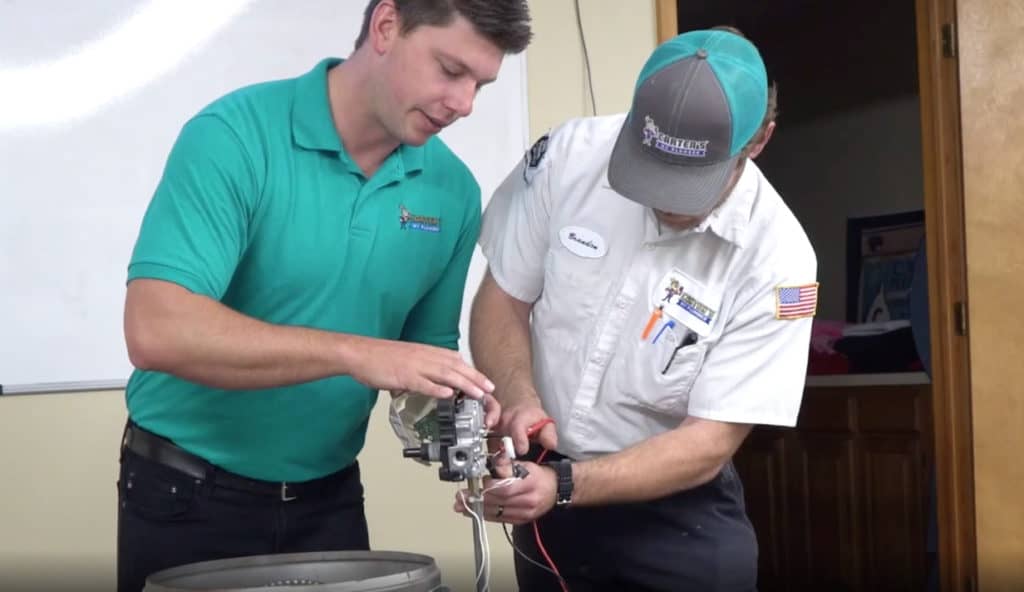Table of Contents
Our Advice: Choose Water Softener Pellets
At Carter’s My Plumber, we highly recommend choosing salt pellets. What happens when you use salt crystals is a “salt bridge” can form. A salt bridge is a hard crust that develops over the water in the brine tank, making it impossible for regeneration to occur. Salt pellets generally do not clump together and therefore, a bridge won’t form. For this reason, we think they make the best type of salt overall.
As for specific brands, most water softening pellets work reasonably well. If you want to select a tried-and-true product that has high levels of customer satisfaction, it’s tough to beat the Morton Salt brand. However, other brands can also work just fine if you have a hard time locating Morton Salt at your local plumbing supply store.

Water softeners can make a huge impact on your home plumbing system, and even lead to dramatic improvements to your quality of life. The right water softener can help you get rid of those mineral deposits that clog your pipes and leave residue in your sink. It may even help promote the health of your skin and hair. However, for any of this to happen, you need a water softener that’s functioning at an optimal level. And generally speaking, that means using the right salt.
The quality of your softener salt can play a huge role in the overall impact of your water softener system. However, actually choosing the right salt can be more difficult than you’d imagine. The sheer number of options is seemingly endless. For instance, water softener salts are available in a number of brands, and span such forms as evaporated pellets, rock salt, sea salt, salt crystals, and more.
Where are homeowners supposed to turn as they seek the best salt to ensure high water quality? One step you can take is to reach out to the plumbing company you hired to install your water softener system in the first place to provide you with ongoing water softener maintenance. (If you live in Indianapolis or the surrounding area, feel free to contact Carter’s My Plumber. We are proud to be a top water softener company in Indianapolis.)
In the meantime, we’re happy to tell you everything you need to know about choosing the best water softener salt.
What to Consider When Choosing Water Softener Salt
With that said, there are a number of factors to keep in mind as you seek the best performance for your home water softener. Here’s a quick rundown of some of the major shopping considerations.

The Type of Salt
As we’ve noted, there are multiple types of salts to choose from, and our overall recommendation is to choose pellets.
If you’d like to learn more about the individual types of water softener salt, here is a quick summary.
- Salt crystals. Salt crystals are formed by expelling salt, brine, and water to the wind, which leads to some evaporation. The process usually results in roughly 99.6 percent sodium chloride. As we noted above, salt crystals are prone to bridging, which means they are usually a bad option. However, they can sometimes work out alright in homes that use a low amount of water, or in homes that have two-part water softening systems.
- Solar sea salt. This type of salt is produced by evaporating sea salt, plain and simple. This tends to be a very soluble option, and you can get it in a 99.5 percent pure form. Solar sea salt can be an inexpensive option, but there is a catch: Solar sea salt comes with a high percentage of imperfections, which means it does not dissolve in hard water quite so easily. As such, we usually only recommend this in homes where the water softening needs are very minor, and where maintaining high salt levels isn’t quite as imperative.
- Rock salt. This type of salt gets its name because it’s made up of irregularly shaped salt pieces, which often look quite a bit like rock. Again, this is a cheap option that doesn’t always perform as well, as the salt itself tends to have a higher percentage of calcium sulfate. It will usually leave a residue in the brine basin of your water softening system, which means you’ll need to clean the system more frequently.
- Potassium chloride. Some people actually shouldn’t use salt due to certain health problems, including high blood pressure. For these homeowners, potassium chloride makes a good salt substitute. Not only does potassium soften water, but it can actually help decrease your blood pressure!
- Salt pellets. Salt pellets are made by refining salt crystals into pure sodium chloride. Pellets do not bridge, they dissolve easily, and they do not leave any residue. In most cases, they are the best option for keeping your water softener up and running.
Purity
Another factor to keep in mind when shopping for water softener salt is purity. Essentially, this just means the percentage of material other than salt that’s found in the product. If a salt is very pure, that means it has a low amount of insoluble materials, such as earth and rock.
There are a number of reasons why it’s best to choose water softener salts with higher purity levels. For one thing, these salts tend to last a lot longer, which means better bang for your buck. Additionally, impure water softener salts usually leave a residue in basins, which means clean-up. Water softener salts that are more pure are less likely to leave residues behind.
Most softeners hit the 99.5 sodium chloride level. Water softener pellets hit a full 100 percent purity. Again, this is part of the reason why we think pellets are the superior option, and why we recommend them to the overwhelming majority of the homeowners we work with.
Home Water Hardness and Usage
As you shop for water softener salts, you should think about more than just the products themselves. It’s also important to reflect on your own home water hardness, as well as your water usage.
If you have a smaller household with just a couple of people in it, you’ll probably need two 40-pound bags of salt added every couple of months. Larger families may go through as many as four bags of salt in the same period of time.
Additionally, if you have a home where the water is quite hard, with excessive amounts of mineral content, you’ll need more salt. As such, it makes sense to have your water hardness level tested before you start looking for salt, so that you’ll have a good sense of what you need. Your plumbing company can help you with this.
For households that are larger or have harder water, pellets can be especially helpful, as they will help you get more use out of each load of salt.
Maintenance Expectations
Something else for homeowners to keep in mind is that the type of salt you choose for your water softener can have a huge impact on the level of maintenance you have to perform. Remember that if you have a salt that has a lot of irregularities in it (that is, a salt that is less pure), it will leave residues and deposits behind. To remove these residues and deposits, the water softener will need to be flushed and cleaned, which is a pretty big job.
Choosing a more pure water softener can minimize maintenance needs for your water softener. Once again, pellets are clearly the standout option.
What are the Benefits to Choosing the Right Water Softener Salt?
As you consider the need for Morton Salt, Diamond Crystal, and other brands of salt pellets, it may be worth stepping back to remember all the benefits that come from having a well-functioning water softener or water conditioner.
Some of these benefits include:
- Healthier hair and skin. Hard water is full of mineral content, which can ultimately damage the health of your hair and skin. Removing these water minerals and other impurities can help you minimize symptoms such as dry skin and brittle hair.
- Better-tasting water. Another reason to eliminate mineral buildup from your water? It can actually improve the taste of your household drinking water. Indeed, the correct salt usage can purge the bad taste created by fluoride, iron, etc.
- Improved hot water heater performance. Still another benefit to using a great evaporated salt pellet brand, like Morton salt, is that it prevents buildup of minerals in your hot water heater. This improves the performance of your system and helps prevent clogs.
- Extended appliance lifespan. One final benefit to choosing the correct salt for water softeners? Doing so will increase your quality of water so much that it minimizes undue wear and tear on your dishwasher, laundry machines, and more.
Tips on Using Morton Salt or Diamond Crystal Correctly
We mentioned our preference for salt-based water softeners, and especially for the Morton brand, Diamond Crystal, and similar pellet-based salts. While choosing the correct type of salt is essential, it’s equally important to use that salt correctly. At Carter’s My Plumber, we often hear from homeowners who have questions about how much salt they really need in their salt-based softeners in order to ensure the highest level of water quality.
Our advice: It’s important to not overload your water softener tank. Too much salt can prevent the tank from regenerating properly. Two bags at a time is a good measure, but no more than half full. And again, the purest grade should be used – make sure there aren’t any fillers or additives.

More Questions? Ask a Water Softener Expert
Whether you have questions about choosing the right form of pellets, adding enough salt per gallon of water, or water softener installation cost, we invite you to schedule an appointment with a water softener expert. Reach out to Carter’s My Plumber whenever you’re ready to schedule a water softener maintenance appointment.
Frequently Asked Questions About Getting Soft Water
Still have some questions about selecting the right type of salt, or maintaining the correct salt levels? Here are a few quick answers to some commonly-asked questions.
Which water softener salt is best?
At the end of the day, the brand doesn’t really matter; Morton is our go-to, but the most important thing is selecting pellet-based salt over solar salt and other forms. Additionally, it matters very much that you choose the highest grade of purity, meaning minimal imperfections or impurities in the salt.
Does it matter what salt I use in the water softener?
Truthfully, the brand doesn’t matter nearly as much as the type of salt. Salt is salt, and if you find a brand of pellets that has a high grade of purity for an affordable price, that’s probably just fine. Just be careful that what you’re buying doesn’t have a lot of added preservatives.
Again, the type of salt matters more than the brand, and pellets are our recommendation.
Pellets generally provide the lowest level of impurities, which means pellet salt tends to dissolve pretty completely. This means no bridging, no residue in basin beds, and less maintenance overall. It also means that each bag of salt goes a little bit further.
How often to add salt for water softener?
It all depends on a number of factors, including your water usage as well as the size of your household. In a larger household, you will need to add more salt more often. With that said, a good rule of thumb is to check your salt levels every couple of months, adding new salt if necessary. You can always set up an appointment with a trusted plumber to go over important maintenance steps, such as pounds of salt required, etc.
What is the best water softener salt for well water?
For well water, we would again recommend pellets, from brands such as Morton Salt or Diamond Crystal.
How long does a 40 lb bag of water softener salt last?
While it depends on the capacity of the unit and the frequency of regeneration, a 40lb bag will usually last around 10 to 14 days.
Best water softener salt for sensitive skin?
Often, investing in a salt-based water softener is the best way to protect sensitive skin from harmful minerals. With that said, you may also want to consider other types of water softener, or consider potassium chloride over salt. Finally, note that many brands of water softening salt offer sensitive skin versions.
Best water softener salt prices?
To find the best, most affordable prices, it certainly doesn’t hurt to shop around. Often, you can find smaller bags of salt for a starting price of under $10. Look at any home improvement store, on Amazon, or even at a big box store like Target.
Best water softener salt for rust?
There are plenty of salts that work well for minimizing rust, including Morton Clean and Protect with Rust Defense. Just check the packaging before you buy so that you are selecting something that’s designated as being good for rust.
Best water softener salt for hair?
Generally speaking, evaporated salt pellets from any brand should work well for promoting hair health, specifically by eradicating harmful mineral content from your household water supply.
Best water softener salt for iron?
Morton Clean and Protect with Rust Defense is a good one, though again, most salt pellets with a higher purity level are going to work well for minimizing iron content in your water.
Blue vs yellow water softener salt?
As you shop for different types of salt, you may notice that different brands come in different colored bags. Don’t worry too much about this. The important thing is to keep that brine tank full, and to select evaporated salt pellets over rock salt, solar salt, etc.
Which Diamond Crystal salt is best for water softeners?
This is a perfectly fine brand, and our only word of guidance is to look for the pellet with the highest purity grade.
Is solar salt better than pellets?
Definitely not. Solar salt does not dissolve quite as fully as pellets, which can lead to a number of problems. Specifically, solar salt will put you at a higher risk for bridging, for buildups in your resin tank, and more. Solar salt leads to more maintenance and decreased performance. To ensure the best water softening process, choose pellets instead of solar salt.
Can I mix salt pellets and crystals?
Different types of salt tend to work well together, and there is no real danger in mixing them. With that said, just sticking with pellets is the best best, whenever possible.
Is it better to use pellets or crystals in my water softener?
We recommend pellets over rock salt and other types of water softening salt.
Can I just use table salt in my water softening process?
Using table salt is not recommended, because the salt particles are quite a bit smaller and are thus much more likely to get “mushed up” within the system. Avoid regular salt in favor of products specifically made for water softening systems.



